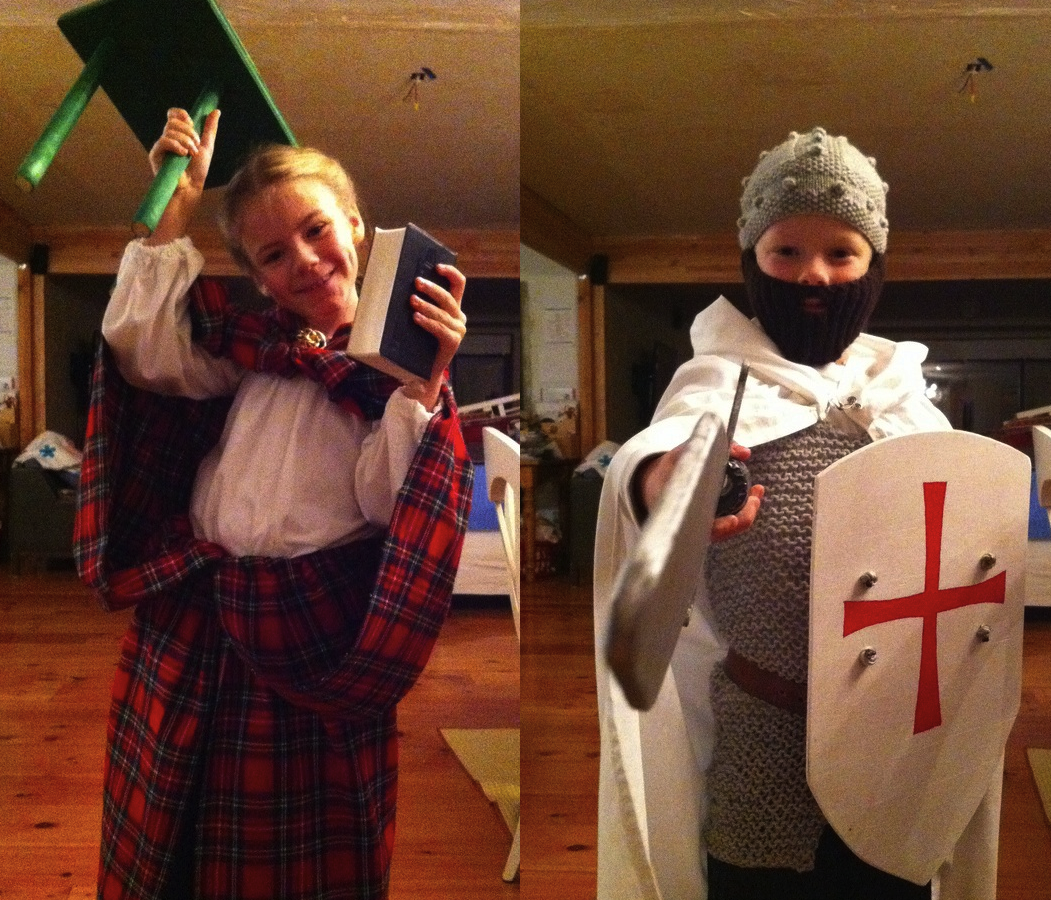Reformation Day
I spoke yesterday for the Reformation Day assembly at Providence Classical Christian School where our two oldest kids attend. Here’s Maggie as Jenny Geddes and Calvin as a Redcrosse Knight. Below the picture are the notes for my talk.

In Geneva, Switzerland, near the church where John Calvin taught on a daily basis, there is a city park. The park contains a memorial to the sixteenth-century Protestant Reformation, a football field long wall adorned with statues of Calvin, John Knox, and other Reformers. Chiseled into the stone around these men is the Latin motto: Post Tenebras Lux, “After darkness, Light.”
The “darkness” refers to the spiritual darkness during the late Middle Ages, a time period also known in history as the Dark Ages. Darkness keeps men from seeing reality. Reality is there, just as the furniture is still in a room when the lights are off, it just isn’t seen. Throughout the Dark Ages there was an eclipsing of God, a hiding of the truth of the gospel that had an impact on virtually every part of society.
What was the spiritual condition of pre-reformation Europe? People were ignorant about God. They didn’t know what His Word said, largely due to the fact that they didn’t have their own copies of the Bible to read in their languages. People adopted their beliefs (more like superstitions) second-hand rather than from Scripture. Perhaps the darkest point of all was that doctrine of justification by faith alone, and therefore any hope of true salvation, was all but extinguished.
First generation reformers like William Tyndale and Martin Luther and Ulrich Zwingli realized that the cause of corruption in the Church was its corrupt teaching, and until the doctrine of the Church was corrected, the abuses would continue. We don’t get fussy because their are problems in the church; there are always problems. We get fussy when we can’t see God.
The Reformation recovered “the light of the gospel of the glory of Christ” (2 Corinthians 4:4), restoring the light of the truth and shining bright the Word of God. Jesus Himself said, “I am the light of the world. Whoever follows me will not walk in darkness, but have the light of life” (John 8:12). The Reformation returned the focus to Jesus Christ. “After darkness, light.”
This is where any reformation today must start as well–good theology centered on Christ. As the Reformation gained momentum it clarified itself with a fresh set of convictions about the faith, the Pillars of the Reformation, the Five Solas:
- Sola Scriptura - Scripture is the only inerrant authority
- Sola Fide - Faith is the only way to be reconciled to God
- Sola Gratia - Grace is the only way we can come to God
- Solus Christus - Jesus Christ is the only Lord and Savior
- Soli Deo Gloria - God’s glory is the ultimate purpose of all things
God used men such as Tyndale in England and Luther in Germany and Calvin in Switzerland and Knox in Scotland to bring truth to light. We know that these men weren’t perfect. We don’t want to follow men instead of following Christ, but we do want to follow men as they followed Christ. We stand on their shoulders; we stand downstream from their influence. We dress like them and fight with foam swords to rejoice in Christ’s culture changing work through the gospel. Remembering the Reformation isn’t merely a counter-cultural act, it may change our culture today as we are faithful to the light.
The main reality of every square inch of the universe, of every second of every minute in history, of every word in every text in Scripture is God. Wherever God is present, He’s King. And wherever the King is, He’s to be worshipped. The point of the Reformation was to display and polish and shout and write about and love “the glory of God in the face of Jesus Christ” (2 Corinthians 4:6).
The Reformation was one of the greatest corporate works of the Holy Spirit in all of church history. We are right to remember it. We are right to celebrate God’s work and the light He shined among His people. It was more than just a stop to abuses, it was a renewed vision of God Himself. We need the light of His Word to blaze and burn among us today as it did in the 16th century–post tenebras lux–after darkness, light.